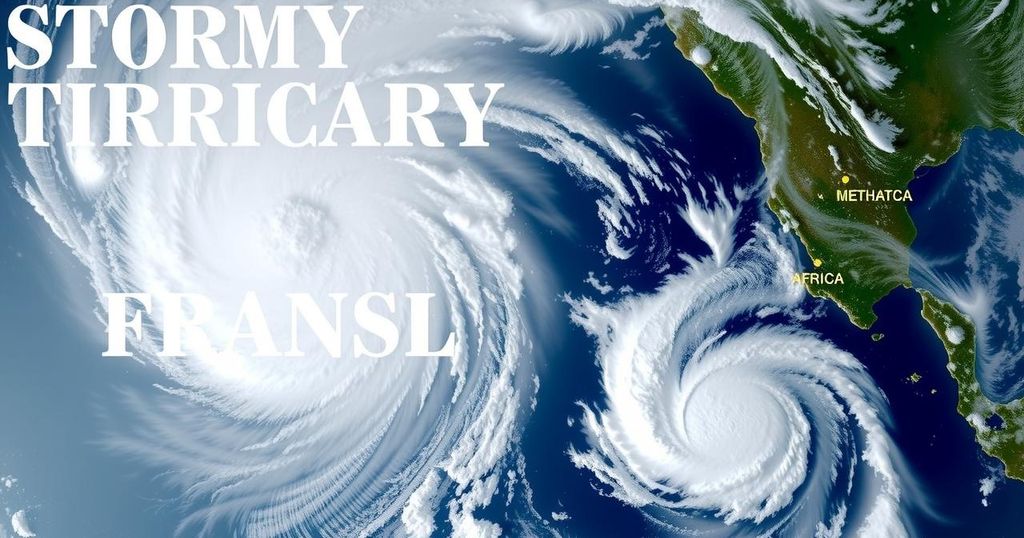World news
AFRICA, BRUNO RETAILLEAU, CHI, CNN, EMERGENCY RESPONSE, EMMANUEL MACRON, EUROPE, FRANCE, FRANCOIS BAYROU, FRANCOIS DUROVRAY, FRENCH INTERIOR MINISTRY, INDIAN OCEAN, INTERIOR MINISTRY, MAYOTTE, MOZAMBIQUE, NATURAL DISASTER, NATURAL DISASTERS, OLYMPIC GAMES SECURITY, PARIS, REUNION, WEATHER SERVICE
Marisol Gonzalez
0 Comments
Cyclone Chido Causes Devastation in Mayotte, Threatens East Africa
Cyclone Chido has caused severe destruction in Mayotte, leaving multiple casualties and extensive property damage. The storm, with winds exceeding 220 kph, is now moving towards the east coast of Africa, prompting heightened emergency measures in neighboring regions like Mozambique and Comoros. Several thousand people may be affected by impending flooding, highlighting the continuous humanitarian challenges posed by increasingly severe cyclone seasons in the area.
Cyclone Chido has wreaked significant havoc in the French territory of Mayotte located in the Indian Ocean, with reports indicating several fatalities. As the cyclone progresses towards the eastern coast of Africa, Bruno Retailleau, the French Interior Minister, provided a preliminary assessment, stating, “We’re afraid the toll will be high, but for the moment I can’t give any figures.” The cyclone has unleashed winds exceeding 220 kph (136 mph), causing extensive destruction to infrastructure and homes in Mayotte, which houses over 300,000 residents across two main islands.
The newly appointed French Prime Minister François Bayrou identified severe damage to public facilities including the prefecture, hospital, and airport, while emphasizing the extraordinary risks faced by inhabitants living in substandard housing. French President Emmanuel Macron is actively monitoring the crisis. François-Xavier Bieuville, the prefect of Mayotte, characterized the cyclone as the most destructive to impact the island since 1934, stating that “Many of us have lost everything.”
In total, 1,600 police and gendarmerie personnel have been dispatched to assist the local population, alongside more than 100 rescuers and firefighters from France and Reunion. The cyclone has inflicted major structural damage on Mayotte’s airport, hampering relief operations, with only military aircraft initially permitted to land.
The surrounding island nation of Comoros is also enduring the impact of Cyclone Chido, prompting authorities to close government services, schools, and airports. The storm is projected to traverse toward Mozambique, where approximately 2.5 million individuals may face severe implications in the northern provinces. Countries like Malawi and Zimbabwe are on heightened alert for potential flooding and evacuations.
Recent years have seen a surge in cyclone activity during the cyclone season between December and March in the southeastern Indian Ocean and southern Africa, exacerbating humanitarian crises in nations that contribute minimally to climate change. Cyclones not only elevate the likelihood of flooding and landslides but also create conditions conducive to outbreaks of diseases like cholera, dengue fever, and malaria, as highlighted in prior events like Cyclone Idai in 2019.
Cyclone Chido illustrates the ongoing climate challenges affecting the southwestern Indian Ocean and southern Africa, particularly through the intensified cyclone seasons observed from December to March. This phenomenon has led to catastrophic events in the past, with Cyclone Idai (2019) resulting in over 1,300 casualties across Mozambique, Malawi, and Zimbabwe. Climate change has been identified as a significant contributor to the increasing severity and frequency of these cyclones, amplifying the humanitarian crises faced by some of the world’s most vulnerable populations who are least responsible for the changes in climate.
In summary, Cyclone Chido’s impact has been notably devastating for Mayotte and the surrounding regions, highlighting the pressing need for international support and preparedness in light of rising cyclone activity attributed to climate change. As evidenced by previous cyclones, the repercussions extend beyond immediate destruction, influencing public health and long-term recovery for affected populations.
Original Source: www.cnn.com




Post Comment